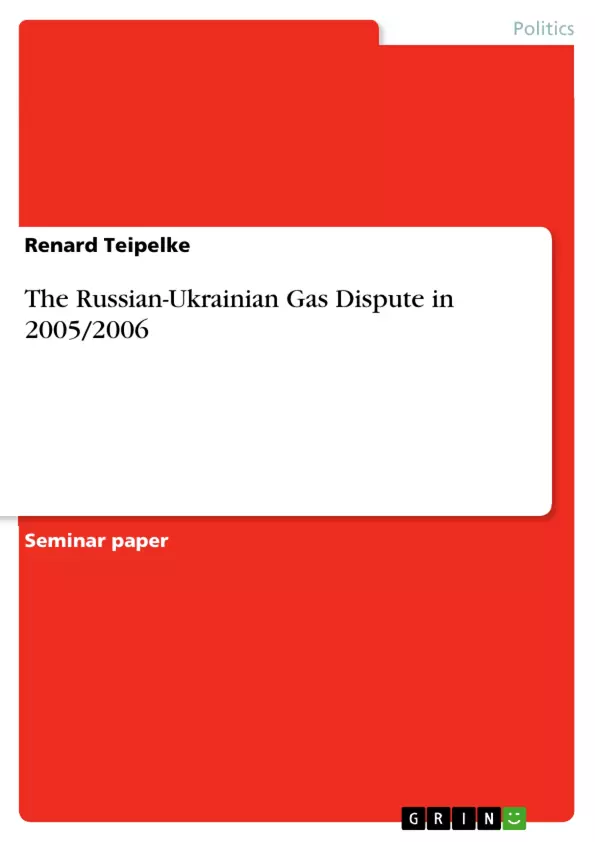Controversies surrounding the delivery of natural gas by Russia and its transfer to Europe over the Ukrainian pipeline network have been a constant feature of Russian-Ukrainian relations. In 2009, the conflict saw a major crisis when Europe was cut off from its essential Russian gas supplies. However, an analysis of the 2005/2006 gas dispute shows how this controversy already foreshadowed many of the problems that later caused the 2009 crisis (cf. Westphal). Therefore, the following discussion will be focused on the events in 2005/2006 presenting the main actors, their interests and mutual interactions. The role of institutions, outcomes of the gas dispute, and implications for the future will also be outlined.
Inhaltsverzeichnis (Table of Contents)
- Introduction
- What happened in 2005/2006?
- What is the puzzle?
- Who wanted what?
- What was the nature of interaction?
- What was the role of institutions?
Zielsetzung und Themenschwerpunkte (Objectives and Key Themes)
This paper examines the 2005/2006 Russian-Ukrainian gas dispute, exploring the factors that led to the crisis and analyzing the role of key actors and institutions. The primary focus is on understanding the dynamics of this conflict, specifically the interactions between Russia, Ukraine, and the European Union.
- The impact of the "Orange Revolution" on Russian-Ukrainian relations.
- The role of economic and political interests in the dispute.
- The implications of the gas dispute for energy security in Europe.
- The influence of domestic politics and special interests on international relations.
- The effectiveness of international institutions in addressing energy disputes.
Zusammenfassung der Kapitel (Chapter Summaries)
- Introduction: This section provides a brief overview of the Russian-Ukrainian gas dispute, highlighting the significance of the 2005/2006 crisis and its relevance to the 2009 gas crisis.
- What happened in 2005/2006?: This section details the events that led to the gas dispute, including the shift in the Ukrainian political system, the rising price of oil and gas, and Gazprom's attempt to transition from Soviet-era trading terms to market-based trade.
- What is the puzzle?: This section explores the paradoxical nature of the dispute, given the mutual dependence of Russia and Ukraine on each other for gas supplies and transit services.
- Who wanted what?: This section analyzes the interests of the main actors involved in the dispute, including Russia, Ukraine, and the European Union.
- What was the nature of interaction?: This section examines the dynamics of interaction between Russia and Ukraine, including the history of their cooperation and the factors that contributed to the breakdown of that cooperation.
Schlüsselwörter (Keywords)
The key concepts explored in this paper include: Russian-Ukrainian relations, energy security, gas transit, natural gas, Gazprom, Naftogaz, "Orange Revolution", European Union, geopolitics, international institutions, special interests, and domestic politics.
Frequently Asked Questions
What caused the 2005/2006 gas dispute between Russia and Ukraine?
The dispute was caused by Gazprom's attempt to shift from Soviet-era subsidized trading terms to market-based prices, following the political shift in Ukraine after the Orange Revolution.
How did the "Orange Revolution" impact the gas dispute?
The Orange Revolution brought a pro-Western government to power in Ukraine, which strained relations with Russia and led Gazprom to demand higher gas prices.
Why is there a mutual dependence between Russia and Ukraine regarding gas?
Russia depends on Ukraine's pipeline network to export gas to Europe, while Ukraine depends on Russia for its own energy supply and transit fees.
What was the European Union's role in the dispute?
The EU acted as a major consumer concerned about energy security, as the dispute threatened the supply of Russian gas flowing through Ukraine to European countries.
Who are Gazprom and Naftogaz?
Gazprom is the Russian state-controlled gas giant, and Naftogaz is the Ukrainian state-owned oil and gas company involved in the negotiations.
What were the implications for European energy security?
The crisis highlighted Europe's vulnerability to supply disruptions and led to calls for diversifying energy sources and transit routes.
- Citation du texte
- Renard Teipelke (Auteur), 2010, The Russian-Ukrainian Gas Dispute in 2005/2006, Munich, GRIN Verlag, https://www.grin.com/document/153500



